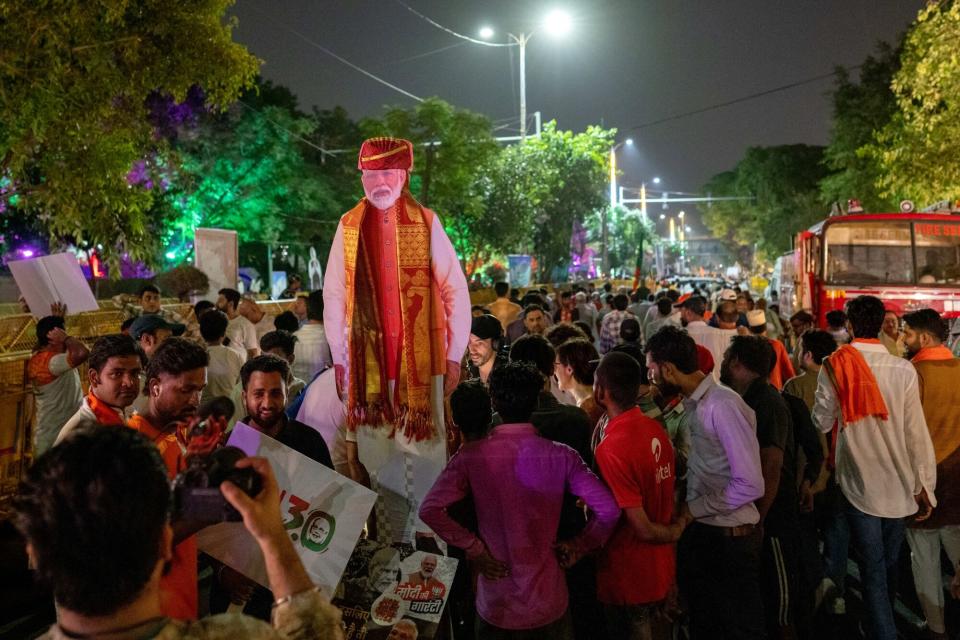India Exit Polls Spark Criticism, Tears and Calls for Probes
(Bloomberg) -- India’s wildly inaccurate exit polls predicting a landslide election victory for Prime Minister Narendra Modi’s party sparked dramatic public apologies from polling companies this week and calls for them to be investigated for possible manipulation.
Most Read from Bloomberg
Real Estate Investors Are Wiped Out in Bets Fueled by Wall Street Loans
Billionaire-Friendly Modi Humbled by Indians Who Make $4 a Day
A Struggling Business Park Deals a Blow to Singapore's Regional Hub Ambitions
Almost all of the exit polls released on June 1 forecast Modi’s Bharatiya Janata Party and its allies would win more than 350 seats in the lower house of the parliament. The final results released three days later put the coalition’s tally at just 293 seats.
The exit polls pushed the benchmark equity index to a record on Monday, followed by a crash a day later when almost $400 billion of value was wiped off the market. Opposition parties called on the country’s stock market regulator and the parliament to investigate the polling companies and BJP leaders for possible rigging.
“People very high up in the BJP have carried out a scam,” Rahul Gandhi, a key leader in the main opposition Indian National Congress, told reporters Thursday. “We’d like to know if these polls were actually carried out, what was the methodology of the polls and who are these investors.”
Prior to the exit polls, Modi and Home Minister Amit Shah had predicted rallies in the stock market, with the prime minister saying it would hit record highs on the day of election results.
BJP spokespeople and Modi’s office didn’t immediately respond to calls and an email seeking further information. Pradeep Gupta of polling company Axis My India denied the allegations of manipulation when contacted by phone.
While exit polls have a patchy record in India — in 2004, they also predicted a comfortable majority for the BJP-led alliance, which didn’t transpire — polling had been generally accurate in 2014 and 2019.
Reasons for the large miss this year are varied. Political analysts point to structural challenges of conducting surveys in a country of almost 1 billion voters, limited resources and inherent biases in surveys.
“It is hard to do a good exit poll in a vast country like India due to several factors — how biased is the sample, the weightage given, who is willing to respond to surveys, which areas the surveyors are going,” Neelanjan Sircar, a senior fellow at New Delhi-based Centre for Policy Research, said by phone.
The mismatch in the election outcome and exit polls also reflects inadequate sample sizes and logistical problems in covering 543 parliamentary constituencies across the country, he said.
Sample Sizes
Polling companies have come out to defend their data. Yashwant Deshmukh, founder of CVoter, said it was accurate in predicting the share of votes won by the parties at the state level, but that projections on seat numbers were wrong, especially in states like Uttar Pradesh, Rajasthan and West Bengal, where the BJP lost substantial support. In states the BJP swept, like Madhya Pradesh, Bihar and Gujarat, their seat projections were accurate, he said.
Deshmukh also cited sample sizes and limited budgets as challenges. Polling in India is as complex as polling in a diverse region like the European Union, he said, but “pollsters don’t have that kind of budget.”
CVoter had predicted the BJP-led alliance would win 353-383 seats nationally. The sample size of its survey was 431,182.
The exit poll results “will hugely dent the credibility of pollsters,” Deshmukh said. “The 2004 election exit polls haunted us for 20 years and the 2024 elections are going to haunt us for another 20 years.”
More accurate analysis came from KCore Analytics, which used artificial intelligence gathered from people’s social media interactions — what they were reading, writing and responding to on the internet — to predict voter preferences. The analysis also used important data like inflation, which could influence polls. The research firm, which is led by Herman Makse, a US-based professor, had predicted the BJP would win 240-250 seats and at least 300 seats with its allies.
Makse said traditional polls go wrong for various reasons, including because respondents lie. AI gives a clearer idea of peoples’ preferences because it relies on the anonymity of the internet, he said.
Gupta of polling company Axis My India broke down on national television on Tuesday after he was repeatedly questioned about his inaccurate forecasts showing the BJP-led coalition would win 361-401 seats. TV anchors on India Today, which had sponsored the poll, consoled Gupta by telling him that at least he’d gotten the winner right.
Gupta said Thursday if opposition groups allege the exit polls were rigged, they should provide evidence.
“Our methodology and processes are robust, and open for anyone to come and check. We do our job with honesty and full integrity,” he said. Of the 69 elections the company has covered, it accurately called 65 of them, he said, adding that “our record speaks for itself.”
--With assistance from Swati Gupta and Sudhi Ranjan Sen.
(Updates with comments on AI analysis.)
Most Read from Bloomberg Businessweek
Sam Altman Was Bending the World to His Will Long Before OpenAI
David Sacks Tried the 2024 Alternatives. Now He’s All-In on Trump
Legacy Airlines Are Thriving With Ultracheap Fares, Crushing Budget Carriers
©2024 Bloomberg L.P.





